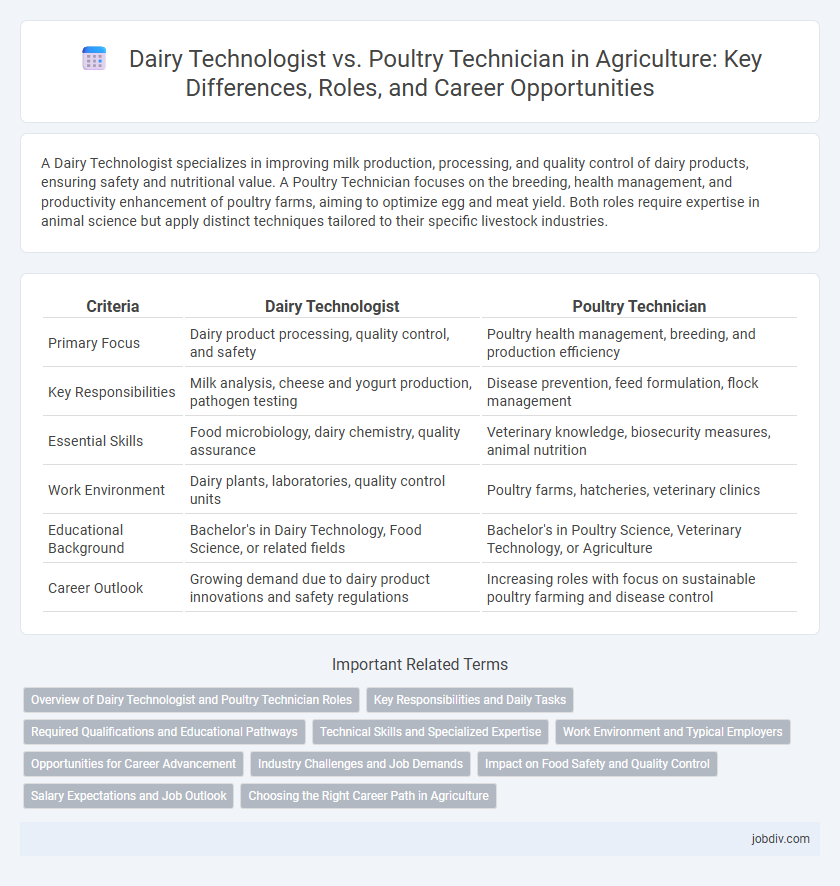A Dairy Technologist specializes in improving milk production, processing, and quality control of dairy products, ensuring safety and nutritional value. A Poultry Technician focuses on the breeding, health management, and productivity enhancement of poultry farms, aiming to optimize egg and meat yield. Both roles require expertise in animal science but apply distinct techniques tailored to their specific livestock industries.
Table of Comparison
| Criteria | Dairy Technologist | Poultry Technician |
|---|---|---|
| Primary Focus | Dairy product processing, quality control, and safety | Poultry health management, breeding, and production efficiency |
| Key Responsibilities | Milk analysis, cheese and yogurt production, pathogen testing | Disease prevention, feed formulation, flock management |
| Essential Skills | Food microbiology, dairy chemistry, quality assurance | Veterinary knowledge, biosecurity measures, animal nutrition |
| Work Environment | Dairy plants, laboratories, quality control units | Poultry farms, hatcheries, veterinary clinics |
| Educational Background | Bachelor's in Dairy Technology, Food Science, or related fields | Bachelor's in Poultry Science, Veterinary Technology, or Agriculture |
| Career Outlook | Growing demand due to dairy product innovations and safety regulations | Increasing roles with focus on sustainable poultry farming and disease control |
Overview of Dairy Technologist and Poultry Technician Roles
Dairy Technologists specialize in milk production, quality control, and dairy product processing, ensuring compliance with health and safety standards in the dairy industry. Poultry Technicians focus on the breeding, health management, and nutrition of poultry flocks to optimize egg and meat production. Both roles require expertise in animal biology, but Dairy Technologists prioritize dairy product innovation while Poultry Technicians emphasize flock management and disease prevention.
Key Responsibilities and Daily Tasks
Dairy Technologists oversee milk production processes, ensuring quality control, pasteurization, and safety standards, while analyzing dairy products for nutritional content and contamination. Poultry Technicians manage the health and breeding of birds, monitor feed efficiency, and implement biosecurity measures to prevent disease outbreaks. Both roles require close coordination with farm staff and adherence to regulatory guidelines to optimize productivity and animal welfare.
Required Qualifications and Educational Pathways
Dairy Technologists typically require a bachelor's degree in dairy technology, food science, or microbiology, with specialized training in milk processing, quality control, and dairy product development. Poultry Technicians generally need an associate degree or diploma in poultry science, animal husbandry, or agricultural technology, focusing on poultry nutrition, health management, and breeding practices. Both professions benefit from practical experience through internships or farm work, but Dairy Technologists often pursue advanced certifications in food safety and quality assurance.
Technical Skills and Specialized Expertise
Dairy Technologists specialize in milk processing, quality control, and dairy product innovation, possessing expertise in microbiology, fermentation, and dairy machinery operations. Poultry Technicians focus on poultry breeding, disease management, nutrition, and housing systems, with proficiency in vaccination protocols and genetic selection. Both require technical skills in laboratory analysis and animal health monitoring but differ in their specialized knowledge of dairy versus poultry production systems.
Work Environment and Typical Employers
Dairy Technologists primarily work in dairy farms, processing plants, and research laboratories, focusing on milk production, quality control, and product development. Poultry Technicians are commonly employed in poultry farms, hatcheries, and feed production facilities, specializing in the care, breeding, and health management of poultry. Both professions require collaboration with agricultural scientists but differ significantly in workplace settings and specific employer types within the agriculture sector.
Opportunities for Career Advancement
Dairy technologists have opportunities for career advancement through roles in quality control, research and development, and production management within the dairy industry. Poultry technicians can progress by specializing in flock health management, biosecurity, and poultry nutrition, often moving into supervisory or consulting positions. Both careers offer growth potential in agribusiness firms, regulatory agencies, and food safety organizations, reflecting their critical roles in sustainable agriculture.
Industry Challenges and Job Demands
Dairy Technologists face industry challenges such as maintaining milk quality and safety standards while optimizing production efficiency, often requiring expertise in microbial control and pasteurization processes. Poultry Technicians deal with disease management, biosecurity measures, and rapid response to outbreaks to sustain flock health and productivity, demanding continuous monitoring and data analysis. Both roles require adapting to evolving regulatory requirements, implementing innovative technologies, and managing animal welfare under pressure from market fluctuations and climate-related impacts.
Impact on Food Safety and Quality Control
Dairy technologists play a critical role in food safety by ensuring milk and dairy products meet stringent hygiene standards through rigorous testing and quality control protocols. Poultry technicians impact food safety by managing biosecurity measures and monitoring disease control to prevent contamination in poultry production. Both professionals contribute to maintaining high-quality food products, but dairy technologists emphasize chemical and microbiological analysis, while poultry technicians focus on animal health and environmental management.
Salary Expectations and Job Outlook
Dairy technologists typically earn an average salary ranging from $45,000 to $65,000 annually, reflecting their specialized skills in milk production and quality control, while poultry technicians command salaries between $35,000 and $50,000, driven by expertise in poultry health and farm management. Job outlook for dairy technologists remains strong due to rising demand for dairy product innovation and quality assurance, whereas poultry technicians face moderate growth aligned with increasing poultry consumption and advancements in disease prevention. Both careers require continuous upskilling, but dairy technologists often benefit from higher salary ceilings and broader opportunities in food science and technology sectors.
Choosing the Right Career Path in Agriculture
Dairy Technologists specialize in milk processing, quality control, and product development within the dairy industry, requiring strong knowledge of microbiology and food safety regulations. Poultry Technicians focus on breeding, nutrition, and disease management to enhance poultry production efficiency, emphasizing animal health and biosecurity measures. Choosing the right career path depends on your interest in either dairy product innovation or poultry farm management and your commitment to mastering specialized agricultural technologies.
Dairy Technologist vs Poultry Technician Infographic

 jobdiv.com
jobdiv.com